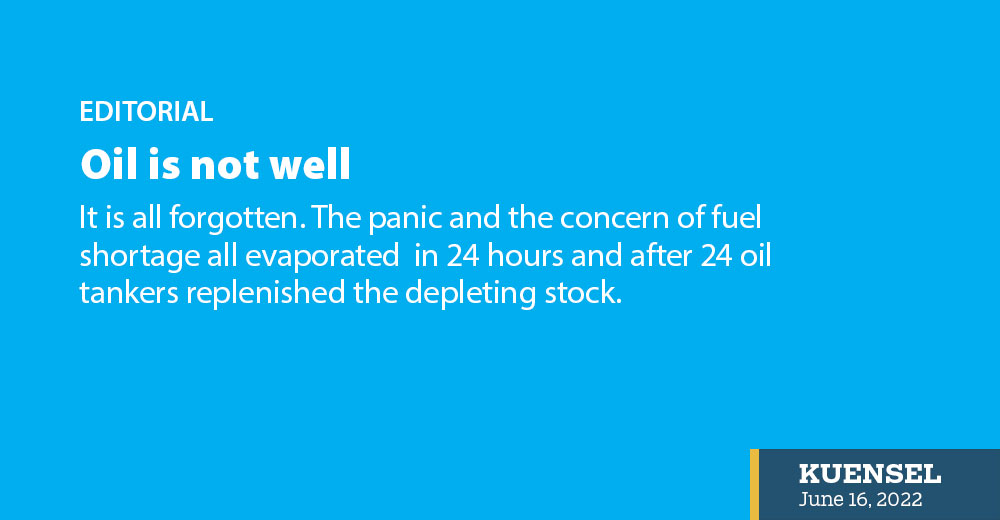It is all forgotten. The panic and the concern of fuel shortage all evaporated in 24 hours and after 24 oil tankers replenished the depleting stock.
The knee jerk reaction of rushing to fuel stations for a “full tank” refill and trying to store in jerry cans started after a rumour of shortages because of price and supply disruptions. With all eyes on the price of fuel and the global supply chain disruptions, there were reasons enough to believe. Politicians rambling about fuel shortages didn’t help. The skyrocketing price added fuel to the fire.
Situation has improved. As of yesterday evening, the queues had become shorter at the fuel stations. However, all is not well. The rush and panic on the auspicious Duchen nga zom could happen again. It could be because of roadblocks or larger policy shifts in the region or triggered by the war in Eastern Europe.
A full tank will last only a few weeks. What after that?
We should not waste what we learnt from the panic and chaos on the auspicious day. It could be a turning point for us. It is an opportunity to relook into our policy decisions, broader visions and plans in transportation. The scene on Tuesday indicates that we have no alternatives but depend on vehicles for movement.
We do not produce fossil fuel. Our fuel import bill is more than what we earn from exporting electricity. Yet, our transport policies are taking time to take off. Affordable and efficient public transport is only picking up despite recognising the importance decades ago. What has picked up so fast is the number of vehicles on the roads. Every month, a few thousands of vehicles are added to our already congested roads. There are 121,274 registered vehicles in the country. This is about one vehicle for every six Bhutanese.
As we look for solutions that are environment friendly- in line with our development policies, the profit driven sector is more active than decision makers. There are more car dealers, a greater variety of vehicles and financial policies to encourage buying cars. Even as we complain of access to finance, congestion and vehicular pollution, there are more cars added to our roads on a daily basis.
Elected governments will not take decisions that would anger the voter base. There is enough evidence from recent incidents that we need a better policy on transportation. Improving and investing in public transportation is one. Looking for alternatives as a champion of environment conservation is another.
Recognising and investing in efficient public transportation should be a priority in the next few years. Creating walkways, bicycle tracks and decongesting should be a priority in urban areas. Besides policies, there should be initiatives like making urban areas pedestrian friendly. Most office-goers in the capital city, for instance, wouldn’t mind walking to the office and back if there are safe walkways.
Controlling fuel price is not in our hands. There are many that are in our hands.


